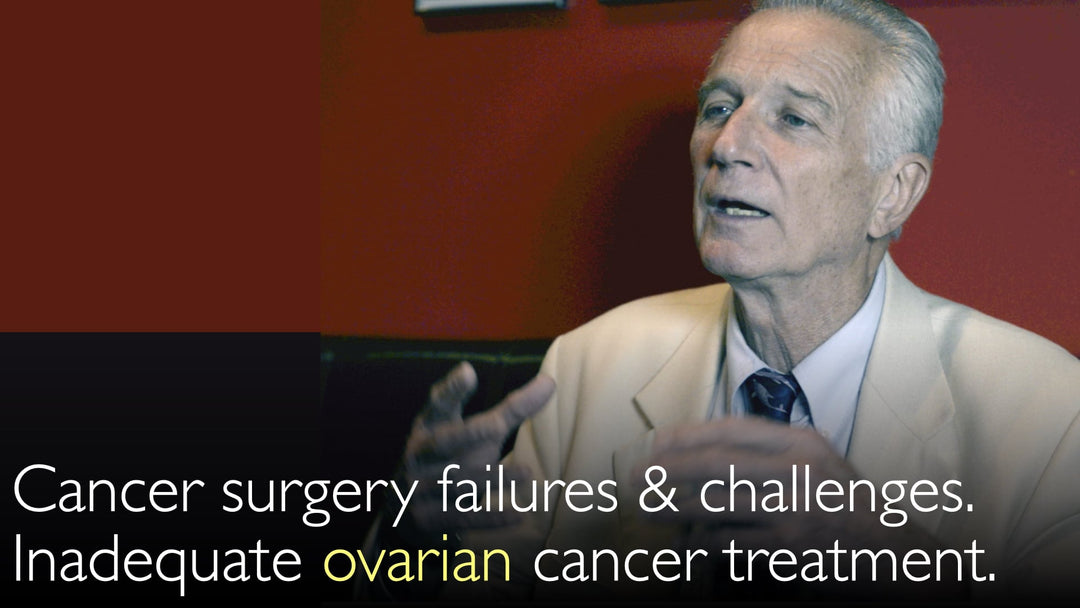O renomado especialista em neoplasias malignas do peritônio, Dr. Paul Sugarbaker, explica por que a cirurgia de redução tumoral é um padrão de tratamento inadequado para o câncer de ovário. Ele defende a realização de uma cirurgia citoredutora meticulosa para remover toda a doença visível. O Dr. Sugarbaker detalha os benefícios de combinar o procedimento cirúrgico com a Quimioterapia Intraperitoneal Hipertérmica (QIPH) e a quimioterapia intraperitoneal de longo prazo. Essa abordagem multimodal agressiva melhora significativamente os resultados para pacientes com câncer de ovário avançado ou recorrente. Recomenda-se que os pacientes busquem cirurgiões experientes nessas técnicas avançadas.
Tratamento Avançado do Câncer de Ovário: Da Redução Tumoral à Citorredução Completa
Navegar para a Seção
- O Problema da Redução Tumoral no Câncer de Ovário
- Abordagem Cirúrgica Ideal: Citorredução Meticulosa
- Papel da Quimioterapia Intraperitoneal Hipertérmica (QIPH) no Tratamento do Câncer de Ovário
- Quimioterapia Intraperitoneal de Longo Prazo (BANC)
- Seleção de Pacientes para Tratamento Agressivo
- Como os Pacientes Podem Buscar o Melhor Atendimento
- Transcrição Completa
O Problema da Redução Tumoral no Câncer de Ovário
O Dr. Paul Sugarbaker, MD, aponta uma falha crítica no padrão atual de tratamento cirúrgico para o câncer de ovário. A prática comum de redução tumoral envolve remover apenas parte do tumor visível, deixando a quimioterapia sistêmica encarregada de eliminar as células cancerígenas remanescentes.
O Dr. Sugarbaker considera essa abordagem um "conceito inadequado". Ele ressalta que, embora o câncer de ovário seja mais sensível à quimioterapia do que alguns tumores gastrointestinais, deixar doença macroscópica residual é uma estratégia subótima. Essa prática não aproveita todo o potencial curativo da cirurgia e pode comprometer a sobrevida dos pacientes a longo prazo.
Abordagem Cirúrgica Ideal: Citorredução Meticulosa
Segundo o Dr. Paul Sugarbaker, MD, o padrão-ouro para a cirurgia do câncer de ovário avançado é a citorredução completa. O procedimento inclui peritonectomia e ressecções viscerais necessárias para eliminar todos os sinais visíveis de câncer na cavidade abdominal, com o objetivo de não deixar evidência visível da doença.
Essa cirurgia meticulosa e, por vezes, radical é o primeiro e mais crucial passo para melhorar os resultados no tratamento do câncer de ovário. O Dr. Sugarbaker observa que esses princípios, já consagrados no tratamento do mesotelioma peritoneal, ainda não são amplamente adotados no câncer de ovário. Ele defende que a implementação dessa abordagem cirúrgica agressiva é fundamental para avançar no cuidado dos pacientes e aumentar as taxas de sobrevida.
Papel da QIPH no Tratamento do Câncer de Ovário
A Quimioterapia Intraperitoneal Hipertérmica (QIPH) é um componente vital do tratamento moderno do câncer de ovário. O procedimento consiste em irrigar a cavidade abdominal com quimioterápicos aquecidos logo após a cirurgia citorredutora. O calor potencializa a penetração e a eficácia da quimioterapia contra eventuais células cancerígenas microscópicas remanescentes.
O Dr. Paul Sugarbaker, MD, cita um importante ensaio clínico randomizado controlado que demonstrou benefício significativo. Pacientes com câncer de ovário recorrente submetidos à cirurgia citorredutora combinada com QIPH tiveram melhores resultados do que aqueles tratados apenas com cirurgia. Essa evidência apoia a integração da QIPH no plano de tratamento multimodal para candidatos selecionados.
Quimioterapia Intraperitoneal de Longo Prazo (BANC)
O Dr. Paul Sugarbaker, MD, defende um regime de quimioterapia prolongado após a cirurgia e a QIPH, chamado de Quimioterapia Adjuvante Normotérmica Bidirecional (BANC). A BANC envolve a administração de quimioterapia diretamente no espaço peritoneal por até seis meses, em combinação com quimioterapia intravenosa sistêmica.
Um medicamento-chave nesse regime é o paclitaxel (Taxol). O Dr. Sugarbaker explica que o paclitaxel é "excelente" para uso intraperitoneal, pois permanece na cavidade abdominal por longos períodos—até 23 horas. Essa exposição prolongada oferece um ataque contínuo às células cancerígenas microscópicas, superando em muito a breve duração da QIPH.
Seleção de Pacientes para Tratamento Agressivo
O Dr. Paul Sugarbaker, MD, enfatiza que esse tratamento multimodal agressivo não é adequado para todas as pacientes. A seleção criteriosa é essencial para o sucesso e para evitar danos. Fatores como idade, condição física geral e capacidade de tolerar uma cirurgia extensa de 8 horas devem ser rigorosamente avaliados.
O objetivo é evitar submeter uma paciente a uma operação de grande porte se ela não tiver condições de sobreviver ao procedimento ou de recuperar uma qualidade de vida aceitável. O tratamento é mais indicado para aquelas com robustez física suficiente para suportar a citorredução, a QIPH e os meses subsequentes de quimioterapia combinada.
Como os Pacientes Podem Buscar o Melhor Atendimento
O Dr. Anton Titov, MD, e o Dr. Paul Sugarbaker, MD, concordam que as pacientes devem ser proativas em seu cuidado. Indivíduos diagnosticados com câncer de ovário devem buscar um cirurgião oncologista disposto e capacitado para realizar a cirurgia citorredutora radical. Muitas vezes, isso significa ir além dos serviços locais e procurar um especialista em um centro de alto volume.
O Dr. Sugarbaker está convencido de que a adoção desse método abrangente—citorredução completa, QIPH e BANC—levará a melhores resultados de tratamento em todo o mundo. As pacientes podem receber dois cateteres implantados: um para quimioterapia intravenosa e outro específico para a administração intraperitoneal de longa duração, viabilizando esse protocolo de tratamento intensivo.
Transcrição Completa
Dr. Anton Titov, MD: Renomado cirurgião oncológico americano formado em Harvard discute problemas comuns no tratamento cirúrgico do câncer de ovário. Cirurgiões e oncologistas devem tratar o câncer de ovário de forma mais agressiva e meticulosa do que frequentemente fazem. "A redução tumoral do câncer de ovário é um conceito inadequado no tratamento do câncer de ovário." O que é BANC, Quimioterapia Adjuvante Normotérmica Bidirecional? Melhores opções de tratamento para câncer de ovário.
Dr. Paul Sugarbaker, MD: A cirurgia do câncer de ovário deve ser mais agressiva. O melhor cirurgião oncológico para câncer de ovário deve remover todos os sinais de células cancerígenas no abdômen e no peritônio. A cirurgia do câncer de ovário hoje em muitos lugares não é adequada. A redução tumoral do câncer de ovário não é suficiente.
Pacientes com câncer de ovário devem ter citorredução meticulosa com peritonectomia e ressecções viscerais até que não haja evidência visível de câncer de ovário. O câncer de ovário se espalha no abdômen e na cavidade peritoneal.
Dr. Anton Titov, MD: Metástases peritoneais no tratamento do câncer de ovário avançado estágio 4 por cirurgia citorredutora e Quimioterapia Intraperitoneal Hipertérmica (QIPH) [banho de quimio quente, quimioterapia aquecida]. Segunda opinião médica esclarece o diagnóstico de câncer de ovário. Segunda opinião médica confirma que a cura é possível no câncer de ovário metastático.
Tratamento com quimioterapia intraperitoneal para câncer de ovário avançado estágio 4 com lesões metastáticas no abdômen. Segunda opinião médica ajuda a selecionar um tratamento de medicina de precisão para câncer de ovário estágio 4.
Obtenha segunda opinião médica sobre câncer de ovário avançado com metástases peritoneais. Melhor tratamento do câncer avançado com metástases peritoneais por operação cirúrgica e quimioterapia regional. Entrevista em vídeo com o Dr. Paul Sugarbaker, principal especialista no tratamento do câncer metastático peritoneal (cirurgia citorredutora e Quimioterapia Intraperitoneal Hipertérmica (QIPH), banho de quimio quente, quimioterapia aquecida.
Melhores opções de tratamento para câncer de ovário. Melhor médico para tratamento do câncer de ovário.
Dr. Anton Titov, MD: O câncer de ovário afeta 1 em 70 mulheres. Mas aquelas que têm mutações BRCA1 e BRCA2 têm incidência muito maior de câncer de ovário. Existem situações de câncer de ovário amplamente divulgadas.
A filha de Pierce Brosnan (ator famoso) e sua esposa faleceu de câncer de ovário. A filha de Pierce Brosnan morreu de câncer de ovário aos 42 anos. A mãe de Angelina Jolie morreu de câncer de ovário aos 56 anos. O câncer de ovário é uma doença muito importante para pessoas mais jovens.
Metástases peritoneais no câncer de ovário são bastante frequentes. Como você trata pacientes com câncer de ovário e metástases peritoneais do câncer de ovário?
Você também publicou estudos mostrando que alguns pacientes com câncer de ovário têm menor potencial maligno das células do câncer de ovário. Diferente potencial maligno das células do câncer de ovário também afeta a seleção de pacientes com câncer de ovário com doença metastática peritoneal para tratamento apropriado. Tratamento do câncer de ovário por cirurgia citorredutora e Quimioterapia Intraperitoneal Hipertérmica (QIPH).
Você poderia comentar sobre o tratamento do câncer de ovário em suas mãos?
Dr. Paul Sugarbaker, MD: O tratamento do câncer de ovário por cirurgia citorredutora e Quimioterapia Intraperitoneal Hipertérmica (QIPH) é um trabalho em andamento. Existe agora um único estudo randomizado controlado sobre tratamento do câncer de ovário. Ele mostra que pacientes com câncer de ovário recorrente têm melhor evolução se fizerem cirurgia citorredutora e Quimioterapia Intraperitoneal Hipertérmica (QIPH).
Pacientes com câncer de ovário evoluíram melhor quando a cirurgia citorredutora foi combinada com QIPH do que quando apenas a cirurgia citorredutora foi usada para tratar o câncer de ovário. Este é um estudo muito importante.
Existem 4 ensaios clínico randomizados controlados sobre tratamento do câncer de ovário ativos atualmente. Estes ensaios clínicos em câncer de ovário fazem esta pergunta.
Dr. Anton Titov, MD: A cirurgia citorredutora sozinha deve ser usada para tratar o câncer de ovário? Ou a cirurgia citorredutora deve ser combinada com Quimioterapia Intraperitoneal Hipertérmica (QIPH)? Tratamento do câncer de ovário por Quimioterapia Intraperitoneal Hipertérmica (QIPH) além da cirurgia citorredutora para ressecar metástases do câncer de ovário no espaço peritoneal?
Dr. Paul Sugarbaker, MD: Sim. Eis o que eu diria sobre a cirurgia do câncer de ovário neste momento. Hoje o conceito de tratamento do câncer de ovário por cirurgia é a redução tumoral. Este é o padrão de cuidado para a maioria dos cirurgiões que realizam tratamento do câncer de ovário por operação cirúrgica.
"Redução tumoral" é a remoção de parte, mas não de todo o tumor. Cirurgiões apenas removem parte do tumor do câncer de ovário. Eles esperam que a quimioterapia sistêmica mate o restante das células tumorais do câncer de ovário.
É verdade que a quimioterapia no câncer de ovário é bastante eficaz. A quimioterapia no câncer de ovário é mais eficaz do que a quimioterapia do câncer gastrointestinal. Mas o padrão atual de tratamento de redução tumoral cirúrgica do câncer de ovário é um conceito inadequado. É um conceito inadequado.
Pacientes com câncer de ovário devem ter a mesma citorredução meticulosa com peritonectomia e ressecções viscerais até que não haja evidência visível de doença. Pacientes com câncer de ovário devem ter uma ressecção radical de todo o câncer visível. Isto é o que teríamos para o mesotelioma peritoneal.
Isso não está acontecendo neste momento. A ressecção cirúrgica radical de todo o tumor do câncer de ovário é o primeiro e maior passo no tratamento melhorado do câncer de ovário. O objetivo é trazer estes princípios de oncologia cirúrgica do tratamento do câncer da cavidade peritoneal para o tratamento de todos os pacientes com câncer de ovário.
Câncer de ovário primário ou recorrente merece o melhor tratamento cirúrgico.
Dr. Anton Titov, MD: No momento não está acontecendo. Mais pacientes com câncer de ovário deveriam ter melhor ressecção cirúrgica dos tumores ovarianos?
Dr. Paul Sugarbaker, MD: Não, não, não é um padrão atual de cuidado para o câncer de ovário. Neste momento, apenas um pequeno número de pacientes com câncer de ovário tem este tratamento. É uma cirurgia muito meticulosa para remover toda a disseminação do tumor do câncer de ovário do peritônio.
Algumas pacientes com câncer de ovário são mulheres idosas. Elas não estão tão em boa forma física. Não é apropriado submetê-las a um procedimento cirúrgico de 8 horas de duração, cirurgia citorredutora e quimioterapia intraperitoneal hipertérmica (QIPH).
É claro, é preciso ser seletivo em relação a qual paciente com câncer de ovário encaminhar para ressecção radical do câncer de ovário. Não vale a pena realizar uma grande operação de câncer de ovário em alguém e depois ter a paciente falecendo no pós-operatório.
Não é apropriado realizar uma cirurgia tão extensa (cirurgia citorredutora do câncer de ovário e quimioterapia intraperitoneal hipertérmica (QIPH)) que a paciente nunca consiga recuperar uma qualidade de vida razoável. É preciso ser seletivo, claro.
Dr. Anton Titov, MD: Mas o primeiro passo para melhorar os resultados do tratamento do câncer de ovário é este. O cirurgião deve usar a peritonectomia com ressecção visceral para remover toda evidência visível da doença do câncer de ovário.
Dr. Paul Sugarbaker, MD: Minha melhor recomendação para o tratamento de pacientes com câncer de ovário neste momento é esta. É a cirurgia citorredutora meticulosa e completa combinada com quimioterapia intraperitoneal hipertérmica (QIPH). Além disso, a quimioterapia intraperitoneal de longo prazo para câncer de ovário deve ser adicionada à cirurgia citorredutora e à QIPH.
Chamamos essa quimioterapia intraperitoneal de longo prazo para câncer de ovário de BANC, Quimioterapia Adjuvante Normotérmica Bidirecional. Após os melhores tratamentos intraoperatórios, a paciente com câncer de ovário recebe quimioterapia combinada intraperitoneal e sistêmica, geralmente por seis meses, para tratar o câncer de ovário.
Para a quimioterapia intraperitoneal de longo prazo do câncer de ovário, utiliza-se uma combinação de medicamentos. Geralmente é cisplatina, carboplatina e taxol. Taxol é paclitaxel.
Paclitaxel é de certa forma um medicamento maravilhoso na quimioterapia intraperitoneal do câncer de ovário. Paclitaxel (Taxol) é, sob uma perspectiva farmacológica, o medicamento com maior probabilidade de ser eficaz na quimioterapia intraperitoneal do câncer de ovário.
Paclitaxel (Taxol) permanece no espaço peritoneal por um longo tempo. Paclitaxel não tem atividade de 60 min ou 90 min enquanto a quimioterapia intraperitoneal hipertérmica (QIPH) ocorre no abdômen da paciente com câncer de ovário. Taxol (paclitaxel) permanecerá 23 horas de 24 horas na cavidade abdominal da paciente com câncer de ovário.
Dr. Anton Titov, MD: Pacientes com câncer de ovário realmente devem tomar a iniciativa. Pacientes com câncer de ovário devem buscar um cirurgião que esteja disposto a ser mais radical no tratamento do câncer de ovário. Pacientes com câncer de ovário devem procurar um cirurgião com melhores habilidades em cirurgia citorredutora radical no câncer de ovário.
Isso pode levar a melhores resultados de tratamento do câncer de ovário para pacientes em todo o mundo.
Dr. Paul Sugarbaker, MD: Sim. Estou convencido de que este método trará melhores resultados no tratamento do câncer de ovário. É a cirurgia citorredutora e quimioterapia intraperitoneal hipertérmica (QIPH) seguida por quimioterapia intraperitoneal de longo prazo.
Pacientes com câncer de ovário frequentemente terão dois portos. Um porto para administrar quimioterapia intravenosa. E outro porto para administrar quimioterapia intraperitoneal de longo prazo para tratar melhor o câncer de ovário.
Dr. Anton Titov, MD: Cirurgião oncológico líder fala sobre o tratamento frequentemente inadequado do câncer de ovário.








